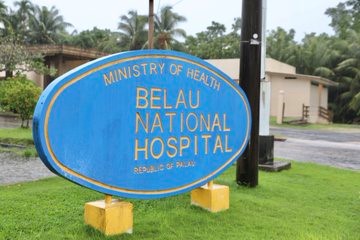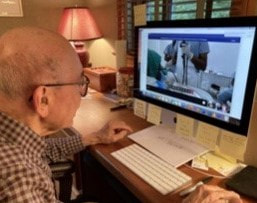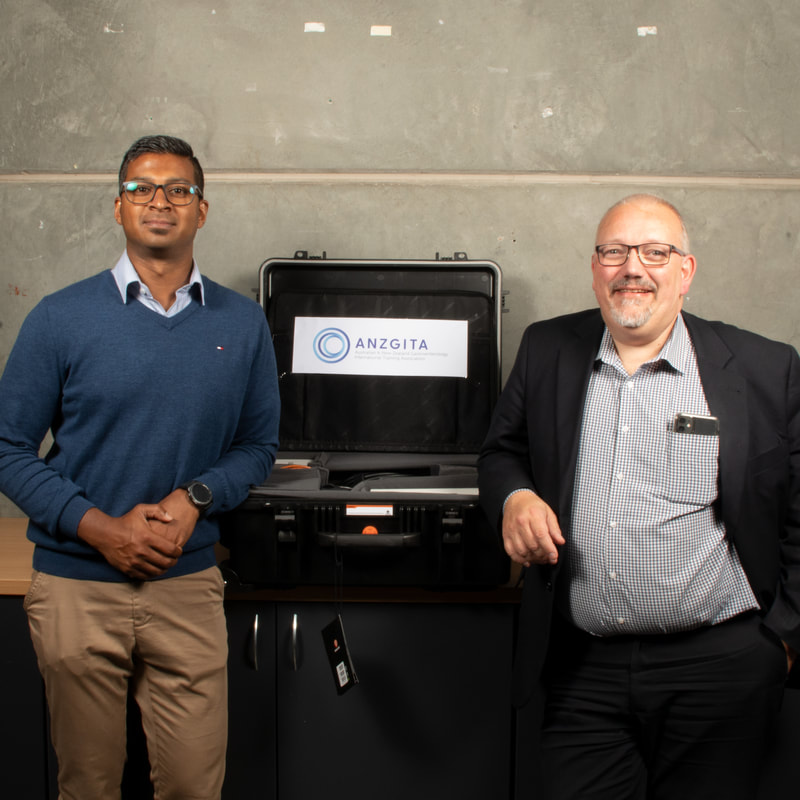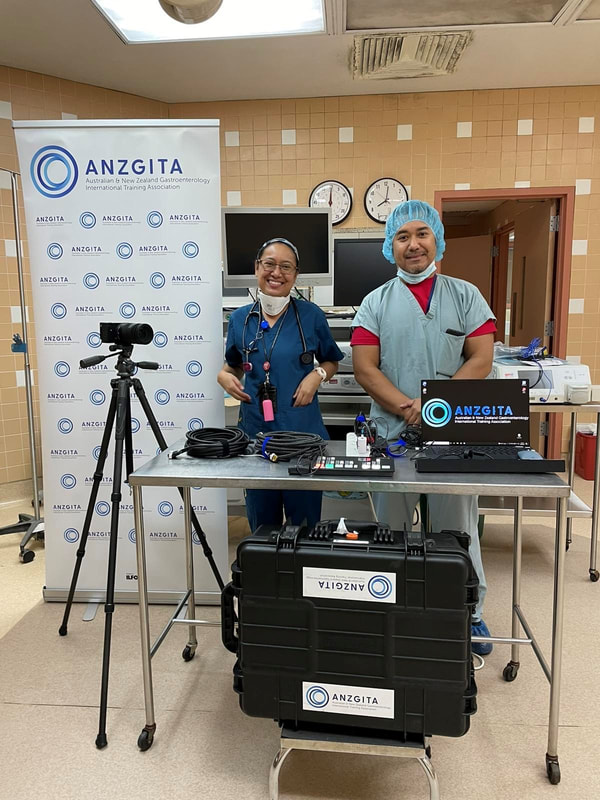Innovative vTERM Project to be Piloted in Early 2022
|
vTERM – virtual Training in Endoscopy by Remote Mentoring is an innovative project which is complementary to the Travel to Teach Model or an effective replacement when the trainer resources are not available for travel to all countries requesting mentoring or in times when travel is not allowed (e.g. COVID-19). It will enable in-procedure remote endoscopy mentoring, performed via Zoom from a distant site. A pilot will be undertaken early in 2022 with Dr Myra Adelbai in Palau who has previously attended ANZGITA training in Fiji and is regularly 'scoping' at Belau National Hospital.
Chris Hair delivered a virtual presentation “Establishing Teaching Endoscopy by Remote Mentoring (TERM) in Oceania” at the GASTRO 2021 Prague, 9-10 Dec. View it on the right. |
|
The feasibility of remote mentoring based on access to images from the endoscope and of the endoscopist has been demonstrated by Prof Jerry Waye (USA) and developed further by Assoc Prof Chris Hair's project team of ANZGITA and partners:
Training assessment will be in cooperation with the Joint Advisory Group (JAG) of GI Endoscopy, Royal College of Physicians. Dr Rahman and Dr Hair are experienced mentors with training in endoscopic mentoring in JAG techniques.
- Dr Myra Adelbai, Belau National Hospital, Palau
- Dr Tony Rahman, Director of Gastroenterology & Hepatology at The Prince Charles Hospital in Brisbane and Adjunct Professor in the College of Medicine and Dentistry at James Cook University
- Prof Des Leddin, Dalhousie University, Canada & Memeber Clinical Research Committee, WGO
- Steve Williams & Ashene Ranasinghe, CR Kennedy Medical Solutions
- Alben Adelbai, Belau National Hospital IT Consultant
- Dr Tomohiko Moriyama & Dr Shunta Tomimatsu, Telemedicine Development Center of Asia (TEMDEC), Kyushu University Hospital, Japan
- Frank Eastaughffe, ANZGITA Secretary and Brian Freestone, ANZGITA Advisory Group
Training assessment will be in cooperation with the Joint Advisory Group (JAG) of GI Endoscopy, Royal College of Physicians. Dr Rahman and Dr Hair are experienced mentors with training in endoscopic mentoring in JAG techniques.
Background
There is a need for education of GI and surgical trainees in medium and low-income countries. This is required to address current care deficits, meet the needs of expanding populations and address retirements from practice. The need for education cannot be met by existing resources in these countries as physician numbers are low and opportunities to train are limited. In addition, there is a need for upskilling and skills review for physicians who are beyond trainee level but who work in isolated areas without the benefit of peer review and support.
Currently teaching of endoscopy skills is often delivered by an expert travelling to a country and teaching on site. This can be supplemented by video and other resources. The advantage of this method is that high quality mentoring is delivered on site by experts. The disadvantage is that it requires travel by the teacher, considerable time commitment and expense. For these reasons there is limited ability to upscale the onsite teaching model to other countries.
The COVID pandemic has severely restricted travel and disrupted training schedules. At some point COVID related restrictions may be lifted but concerns regarding travel and the impact on climate are emerging. An alternative to the current travel to teach model is needed.
Ideally a mentor in a country, for example Australia, could have a holographic image in a remote learning site and be able to experience the same visual and tactile sensations as the trainee. Remote learning techniques are advancing quickly but this level of virtual experience remains aspirational at this point. However, components of the elements required for remote mentoring are already in place. The mentor and trainee can be connected by video link. The room view can be created by video cameras situated at different points in the room. We cannot yet reproduce the sensation of touch and pressure which is an important part of the endoscopy experience. However, initial results suggest tele-mentoring is possible. (Wildi SM, Kim CY, Glenn TF, Mackey HA, Viator GE, Wallace MB, Hawes RH. Tele-endoscopy: a way to provide diagnostic quality for remote populations). Mentoring is an ongoing process, and maintaining mentoring to ensure continued performance at a high level is desirable. Remote mentoring allows this to occur in a way which onsite mentoring cannot.
Nursing is also part of the team and an important part of procedural safety and success. Once the system is up and running we will consider adding a nursing component to the process.
Palau
Palau is an island country in the western Pacific with a population of 20,000. GDP per capita is US$15,000. Dr Adelbai receives five referrals a week for upper endoscopy. Bleeding from varices and ulcers is not uncommon. Colon cancer screening is not in place. An IT team is in place and bandwidth is adequate. The hospital and national health service is supportive.
Components
Site visit - Optimally, a site visit to the location where the remote mentoring will occur should take place before initiation of the program to:
Trainee
Trainers
Currently teaching of endoscopy skills is often delivered by an expert travelling to a country and teaching on site. This can be supplemented by video and other resources. The advantage of this method is that high quality mentoring is delivered on site by experts. The disadvantage is that it requires travel by the teacher, considerable time commitment and expense. For these reasons there is limited ability to upscale the onsite teaching model to other countries.
The COVID pandemic has severely restricted travel and disrupted training schedules. At some point COVID related restrictions may be lifted but concerns regarding travel and the impact on climate are emerging. An alternative to the current travel to teach model is needed.
Ideally a mentor in a country, for example Australia, could have a holographic image in a remote learning site and be able to experience the same visual and tactile sensations as the trainee. Remote learning techniques are advancing quickly but this level of virtual experience remains aspirational at this point. However, components of the elements required for remote mentoring are already in place. The mentor and trainee can be connected by video link. The room view can be created by video cameras situated at different points in the room. We cannot yet reproduce the sensation of touch and pressure which is an important part of the endoscopy experience. However, initial results suggest tele-mentoring is possible. (Wildi SM, Kim CY, Glenn TF, Mackey HA, Viator GE, Wallace MB, Hawes RH. Tele-endoscopy: a way to provide diagnostic quality for remote populations). Mentoring is an ongoing process, and maintaining mentoring to ensure continued performance at a high level is desirable. Remote mentoring allows this to occur in a way which onsite mentoring cannot.
Nursing is also part of the team and an important part of procedural safety and success. Once the system is up and running we will consider adding a nursing component to the process.
Palau
Palau is an island country in the western Pacific with a population of 20,000. GDP per capita is US$15,000. Dr Adelbai receives five referrals a week for upper endoscopy. Bleeding from varices and ulcers is not uncommon. Colon cancer screening is not in place. An IT team is in place and bandwidth is adequate. The hospital and national health service is supportive.
Components
Site visit - Optimally, a site visit to the location where the remote mentoring will occur should take place before initiation of the program to:
- Build trust and relationships
- Meet with hospital administration and local regulatory authorities if necessary.
- Assess the facility, technical aspects, establish the need for the service, and ensure that adequate resources are in place for complications which may arise.
- Assess the trainee’s endoscopic skills and provide an introduction to the basics of endoscopic procedures if necessary.
- Establish the mechanisms of communication and language which will be used by the trainer and the trainer.
Trainee
- Develop more advanced skills
- Increase competence in management of variceal and non-variceal bleeding
- Ensure that the trainee's skill set is optimal.
- Gain confidence in lesion recognition and diagnosis
Trainers
- Demonstrate proof of concept
- Show that the technical issues can be overcome
- Meet the objectives of the trainee
- Disseminate the work




